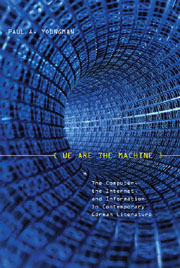Book contents
- Frontmatter
- Contents
- Preface
- Acknowledgments
- Introduction: Machines, Computers, and the Liberal Humanist Subject
- 1 Losing Ground to the Machine: Electronic Brains in the Works of Heinrich Hauser and Friedrich Dürrenmatt
- 2 Fearing the Machine — Two Nightmares in the 1990s: Gerd Heidenreich's New Riddle of the Sphinx and Barbara Frischmuth's Hidden Meaning
- 3 Becoming the Machine: Günter Grass's and Erich Loest's Virtual History, René Pollesch's Postdramatic Imaginings, and “Real” Cyber-Relationships according to Christine Eichel and Daniel Glattauer
- Conclusion: Questions to Ponder
- Bibliography
- Index
3 - Becoming the Machine: Günter Grass's and Erich Loest's Virtual History, René Pollesch's Postdramatic Imaginings, and “Real” Cyber-Relationships according to Christine Eichel and Daniel Glattauer
Published online by Cambridge University Press: 05 February 2013
- Frontmatter
- Contents
- Preface
- Acknowledgments
- Introduction: Machines, Computers, and the Liberal Humanist Subject
- 1 Losing Ground to the Machine: Electronic Brains in the Works of Heinrich Hauser and Friedrich Dürrenmatt
- 2 Fearing the Machine — Two Nightmares in the 1990s: Gerd Heidenreich's New Riddle of the Sphinx and Barbara Frischmuth's Hidden Meaning
- 3 Becoming the Machine: Günter Grass's and Erich Loest's Virtual History, René Pollesch's Postdramatic Imaginings, and “Real” Cyber-Relationships according to Christine Eichel and Daniel Glattauer
- Conclusion: Questions to Ponder
- Bibliography
- Index
Summary
The danger that computers will become like humans is not as great as the danger that humans will become like computers.
— Konrad ZuseContemporary Unease
ADEEPER ANALYSIS of new media theorist Stephan Porombka's notion of “one reality,” as touched on throughout this study, is necessary for any discussion of IT in the twenty-first century. Early in Hypertext, he writes:
I make the assumption that there is one reality and that all medial spaces that are opened belong to this one reality, although — paradoxically — from the distance provided by these spaces, one can observe reality. And I therefore make the assumption that one cannot really flee reality even when one tries, with all one's might, to derealize (entwirklichen) the world and oneself. (20)
Because he is, in part, responding to the hyperbole of the 1990s, his hypothesis implies that “medial spaces” must be actively opened up and entered, similar to the manner in which Boris Reeper accessed cyberspace first through virtual reality gear and then by downloading the contents of his brain and soul into that world. In this way, Reeper fled the real world for the confines/expanse of cyberspace. The presupposition is that humans enter the “medial spaces” and not the other way around. This is a specific way of understanding the spatial relationship between human and machine — and by extension between human and information — that has a certain nineteenth-century air to it.
- Type
- Chapter
- Information
- We Are the MachineThe Computer, the Internet, and Information in Contemporary German Literature, pp. 94 - 152Publisher: Boydell & BrewerPrint publication year: 2009

